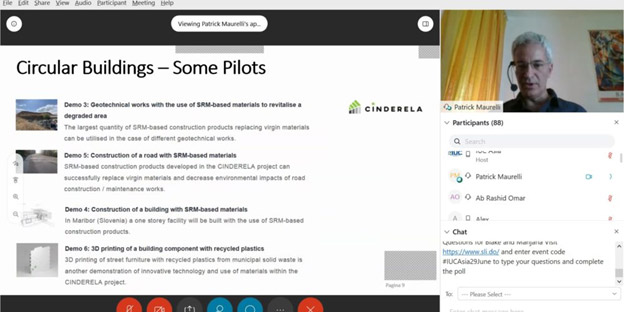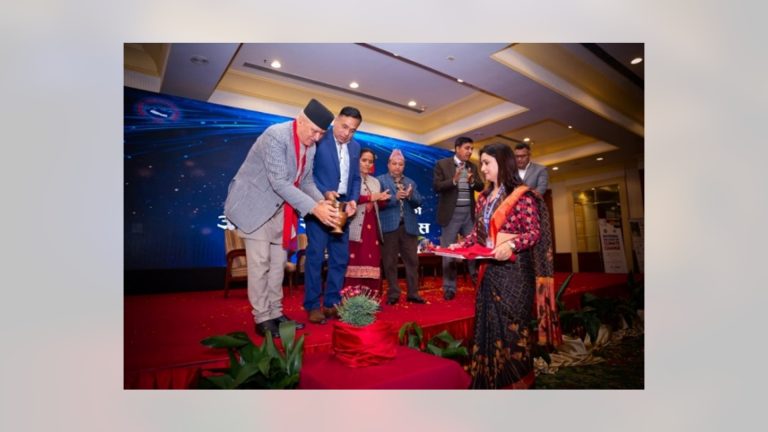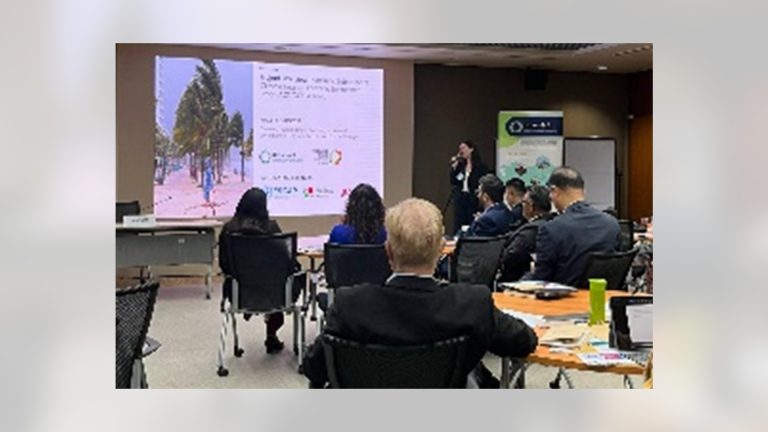UCLG ASPAC has once again assisted its city network to leverage their positive efforts in responding to climate change. Under the framework of IUC Asia programme, UCLG ASPAC has uplifted the cooperation between Malaysian cities (Petaling Jaya and Penang) with the European Union as its global partner to implement the circular economy agenda. The cooperation is also expected to contribute to Circular Economy Roadmap (CER) for plastics, a national level initiative that is planned to be introduced by the end of 2020. Heading towards the goal, the first step took form on IUC Asia Stakeholder Consultation Webinars taking theme “Designing Circular Cities” conducted consecutively on 29 June and 2 July 2020 with Petaling Jaya City Council and Penang Island City Council.
Circular economy is a new way of creating value, and ultimately prosperity, through extending product lifespan and relocating waste from the end of the supply chain to the beginning – in effect, using resources more efficiently by consuming them more than once.[1] Circular economy has gained increasing tractions as a tool which presents solutions to some of the world’s most pressing crosscutting sustainable development challenges. As it addresses root causes, the concept of a circular economy presents opportunities to accelerate the implementation of the 2030 Agenda.
IUC Asia, through stakeholder consultation sessions, supported relevant stakeholders in Malaysia to achieve this mission. Bringing up relevant experts from various sectors in Europe, IUC Asia team expanded the insights to contribute to the unified and collective approach towards a sustainable, circular economic system and an inclusive approach which involves both the informal sector and vulnerable groups.
Both webinars were enriched by more than 150 experts from Malaysia and Europe representing various institutions and governmental bodies. They explored options on how cooperation with cities in Europe would support the transition of Petaling Jaya and Penang into circular cities. Among many interesting initiatives presented were from the Circle Economy organisation that introduced the Circle City Scan Tool which enables cities to align sectoral strategies towards a circular economy development; CITERA at Sapienza University (Rome) that introduced CINDERELA, a new business model for more sustainable urban construction (dealing with construction and demolition waste); and Greater Manchester Combined Authority that explained how they aim for zero waste and how they work closely with local authorities to increase recycling, re-use and waste prevention with their residents – to name a few. There were also representatives from other Malaysian cities, namely Seberang Perai and Iskandar, participating in the consultations and sharing their best practices.
Discussion in both webinars managed to incorporate rich insights in addressing the top five common challenges of Malaysian cities in their transition to the circular economy: (1) food, organic waste and water security; (2) plastic pollution and packaging (in particular single-use plastics); (3) construction material flow and design (including demolition waste); (4) household e-waste and hazardous waste; and (5) lack of digital sharing tools and platforms as an enabler for circular cities. Insights incorporated have built foundation for the expected result of this cooperation.
In essence, the cooperation would be focused on three key areas: (1) research and innovation; (2) knowledge transfer of best practices; and (3) exploring investments and business opportunities. In the long run, the cooperation is expected to foster multi-stakeholder cooperation resulting in these several outcomes: (1) concept notes for pilot projects, involving European cities working in the circular economy clusters, based on EU experience while taking into consideration the interests and external conditions of stakeholders in the public and private sector; and (2) a blueprint for the transition towards the circular economy in Malaysian cities that includes the lessons learned from the above-mentioned stakeholders’ consultations, the tools and recommendations to engage the private sector into the entire cities, and a proposal of 10-year plan to mainstream circular economy principles into the cities’ economic and urban development plans. Ultimately, the deliverables, once composed, is planned to be presented in the national-level government which involves all Malaysian states as recommendation for the creation of the national initiative, Circular Economy Roadmap (CER) for plastics.
IUC Asia is a climate and energy programme funded by EU. UCLG ASPAC IUC Asia team has focused on assisting local governments in Southeast Asia to create Climate Action Plan in order to mitigate impacts of climate change. Through IUC Asia programme, the team also brings best practices from the European pilot cities to achieve circular product design through, e.g. improved durability, reusability, upgradability and reparability of products; increased recycled content in products; restricting single-use and countering premature obsolescence of products. The stakeholder consultation webinars are the extension of the team’s contribution to cities given its expertise and network. UCLG ASPAC IUC Asia team is committed to assist cities of Petaling Jaya and Penang throughout the process to ensure the progress of this promising cooperation.
[1] https://www.unido.org/our-focus-cross-cutting-services/circular-economy











